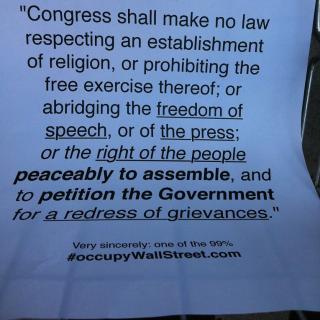Advertisement
In the wake of the police killings of Alton Sterling in Baton Rouge, Philando Castile in St Paul, and Henry Green in Columbus, a Black Lives Matter rally was scheduled for Friday, July 8 at the Franklin Park Amphitheater. But it almost didn’t happen.
As news came in Thursday night about the shootings of Dallas police officers, the original organizers of the action postponed it, citing safety concerns. This didn’t sit well with many who planned to be there. By early Friday afternoon new plans were in place for a speak-out in the evening at the same location. About 450 people showed up.
“Now is not the time to stop fighting police brutality,” said Justice Harley, an organizer with Still We Rise, a black feminist organization at the Ohio State University. “Yes, it is a tragedy that the families of those police officers have to feel the pain and mourning and loss that black people have been feeling for decades at the hands of officers like them. But we have to continue to push for system change, to dismantle the criminal justice system and the systems that profit from the control of black bodies, that profit from our free labor inside of the prisons.
“The police do not protect and serve,” Harley said. “They get paid to control our communities like they are hunting grounds. We need to create community patrol alternatives to the police.”
There were no uniformed police present at the event.
“If we don’t speak up, if we don’t continue to put pressure on the powers that be, to hold them accountable, this will continue to happen,” said Adrienne Hood, mother of Henry Green, who was killed by Columbus police on June 6.
“They walked away like it was nothing — still getting paid, probably back on the beat,” said Hood, who served in the U.S. military for 20 years. “But we lost a son, a brother, a nephew, a cousin, a friend.”
“I was very scared today,” said Jennifer McKenzie. “I was very angry. I was scared to bring my 5-month-old here today because I wasn’t sure if something was going to happen, in light of last night and times before.”
After Adrienne Hood spoke, McKenzie’s seven-year-old daughter asked, “Mommy, is that true? Did that lady really lose her son?” When McKenzie confirmed that it’s true, the girl said, “Mommy, I want to go home, because I’m scared that might happen to me!”
“This is not something that she should be concerned about at seven years old,” McKenzie said.
“There is a war in America being waged against black bodies,” said Sarah Mamo, an organizer with the OSU Coalition for Black Liberation and member of the International Socialist Organization.
“We know that the police do not protect and serve us,” Mamo said. “Their job is to serve and protect the ruling elite from us by keeping us in check. Keeping us in check means brutalizing us. It means murdering us.”
Mamo drew a parallel between U.S. policing practices and global imperialism. “Outside of our borders, the U.S. is a global police force,” she said. “It is not afraid to do to other countries what it does here. In the interest of keeping the U.S. a global economic power, our government has created the conditions for the existence of extremist groups in the Middle East. They don’t want us to unify with the Middle East. The last thing the U.S. government wants is for the exploited masses to come together and unite against them.”
Last year Torin Jacobs started Columbus Citizens for Police Review, a grassroots effort to form a civilian review board to oversee the Columbus Police Department. “The problem is that the system doesn’t want it,” Jacobs said. “In our City Council we have a political machine that resists change.”
Jacobs sees hope in Issue 1, a citizens’ ballot initiative in the August 2 special election that would restore ward representation to Columbus City Council, making council members accountable to districts that they represent.
The current at-large City Council structure shuts out ordinary people who want to represent their neighborhoods, Jacobs said. “City Council appoints the city’s safety director. If we get representation in City Council, we can push for a civilian review board and select a proper police chief who is actually going to listen to the people and not deflect our concerns.”
“Across the country, mayors are calling for the FBI and DOJ to come in because they want to have trust and transparency with the community,” said Sean Walton, attorney for Henry Green’s family. “These are buzzwords that Mayor Ginther and City Council President Zach Klein continue to use. They promise transparency and accountability, but it’s just lip service.”
Walton described the efforts of the Columbus Police Department to control the message, starting on the day that Henry Green was killed. Police spokesman Sgt. Rich Weiner issued this statement to the press.
“Later that night, at 10:25 PM, the Columbus Division of Police posted an official statement on its Facebook page, the same account given by Sgt. Weiner,” Walton said. “This statement was released to the media without investigation of its validity. Not only had all of the potential witnesses not been questioned at the time of this official account of the police, but there were witnesses who had been questioned by police who directly contradicted the official police account of the facts. This calls into question the ability of the department to conduct an unbiased investigation.”
Henry’s Green’s family wants Franklin County Prosecuting Attorney Ron O'Brien appoint an independent prosecutor to oversee the case. Walton questioned the secret grand jury investigation being led by O’Brien. “He has to have a working relationship with officers,” he said. “He’s not going to push for an indictment. He never has.
“We know that there are other witnesses out there,” Walton said. “We’ve spoken with them. We know that this is not a shooting that will end up looking justified, unless the police are allowed to continue their secretive process.”



